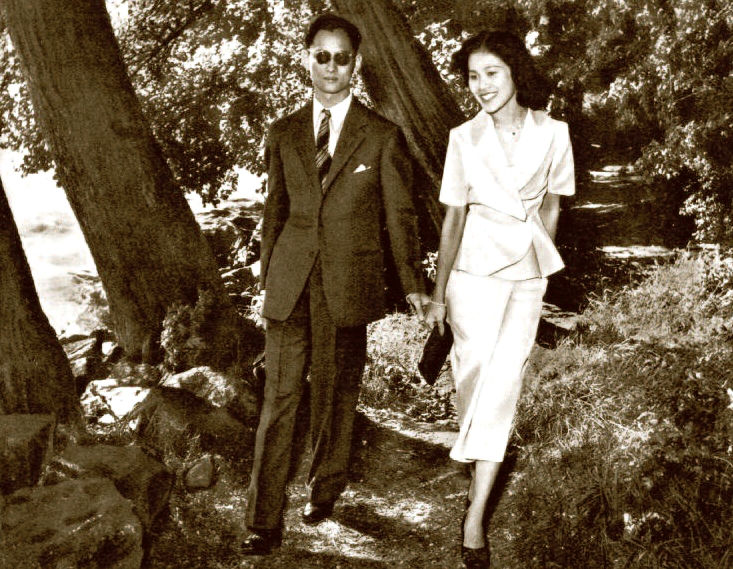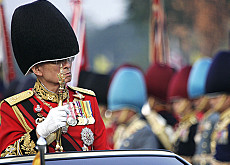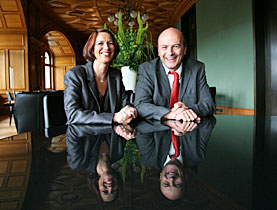The formative Swiss years of a Thai king

Before he became the king of Thailand, Bhumibol Adulyadej lived an almost ordinary life as a student on Lake Geneva in western Switzerland.
A new book, written in French by Swiss journalist and author Olivier Grivat, looks at the adolescence of a shy young man, who was hungry for knowledge and nurtured a love of jazz music and fast cars.
“Your beauty eclipses the splendour of flowers, your complexion makes roses blush. Your skin scorns the smoothness of satin. You are an angel, a human flower… I wish I could live and die on your pies…. I mean, at your side!”
These lines of poetry offer a glimpse of boyhood innocence and humour. The poem, dedicated by two boys to their 18-year-old sister, is also a document of the happy years of a family in exile.
The poem’s authors, Ananda and Bhumibol, lived in an affluent suburb of Lausanne during World War Two.
Ananda was the-then exiled king of Thailand. He only returned to his country in 1945, but died soon afterwards under mysterious circumstances. Bhumibol succeeded him to the throne five years later.
“His story has always fascinated me. Even though nowadays only people over the age of 60 or 70 still remember that a royal family used to live here,” says Olivier Grivat, author of a new book which traces the formative years of the young monarch in Lausanne.
Stories and history
Grivat spent two years researching the life of Bhumibol, digging up documents in archives, reading old newspaper articles and police reports from those days and meeting countless people.
Among the information compiled and the anecdotes gathered are a run-in with a taxi driver, a dog bite, an incident of trespassing and theft from a neighbour’s garden and trips to the mountains.
But Grivat’s book goes beyond the little things in life, and includes contextual chapters on Thailand’s history. It recounts the facts of Ananda’s succession to the throne following a coup against King Pajadhipok in 1932.
As Ananda – first son of Pajadhipok’s elder brother – was still too young to be crowned, a prince regent took over. For several years Ananda continued to live on the shores of Lake Geneva together with his mother, his sister Galyani and his younger brother Bhumibol.
“I’m not very happy about becoming king, because I would prefer to continue to live a life of fun,” the ten-year old Ananda is quoted as saying.
Mother’s principles
When the young monarch died as a result of a gunshot wound in 1946, his brother Bhumibol became the rightful heir to the throne.
Aged 19 at the time, Bhumibol was known as an excellent student at Lausanne University. He read natural sciences but changed to law and political science as it seemed to be more suited to his future role.
His studies included a course in Marxism, which he described as “the exact opposite of what my people need”.
The strict schooling given to the young princes and their sister was a result of their mother’s belief in the power of education, according to Grivat.
“They owe her a lot,” he says. “She told them that a king had to be an educated person who can work hard and who must learn to obey before giving orders himself. This was unheard of at the time. Nobody would have dared to say something similar to the kings of previous generations.”
Fast cars and jazz
But although Bhumibol heeded the advice of his mother, he also had a passion for skiing, sailing and fast cars. The latter nearly cost him his life when his small Fiat Topolino crashed into the back of a truck on the outskirts of Lausanne on October 4, 1948.
Bhumibol was said to be a skilful driver, travelling the pre-motorway roads between Lausanne and Geneva at an average speed of 140km/h. What might be seen as highly irresponsible behaviour today was regarded as sportsman-like at the time, Grivat points out.
“There were no speed limits in those days, there was very little traffic on the roads and the general attitude towards motor cars was completely different,” he says.
Bhumibol was also known to make frequent trips to Paris in his car to see jazz concerts.
Classical music, notably Bach, was fundamental to his education from early on in his life. But listening to the radio the young man discovered the sounds and rhythms from the American continent, and developed a deep passion for the music.
Bhumibol learned to play the saxophone and joined jazz giants such as Benny Goodman, Stan Getz, Lionel Hampton and Benny Carter for sessions. He also wrote about 40 pieces of music himself, ranging from the blues to waltzes.
Worship
In the spring of 1950 Bhumibol returned to Thailand. Having spent 17 of 23 years of his life in Switzerland, he was more fluent in French than in his mother tongue.
A few weeks before his coronation in the royal palace in Bangkok he married Princess Sirikit whom he had met in Lausanne.
It is with this chapter that Grivat’s book on Bhumibol closes. At the same time it marked the beginning of a new era in the life of the king.
“We cannot begin to imagine the extent of worship for this king in Thailand,” says Grivat.
“He has a semi god-like status in his country. His portrait is everywhere, on stamps, banknotes, at road crossings, in restaurants, cinemas and many private homes.”
Grivat is not sure whether King Bhumibol is too happy about this form of adoration. “But he tolerates it,” he adds.
His Majesty still has fond memories of his years in Switzerland, according to Grivat who met the king several times. There is a photo in Grivat’s book of the two shaking hands – an unimaginable familiarity for an average Thai citizen.
“My aim was to avoid writing a book about Bhumibol in a servile attitude. I write about a young man who is also a bit Swiss and whose family sometimes had to make ends meet during World War Two,” says Grivat.
“Un roi en Suisse – La jeunesse helvétique du roi Bhumibol de Thaïlande” (A king in Switzerland – the adolescence of King Bhumibol of Thailand) was published by Favre in Lausanne.
The book, written in French by journalist and author Olivier Grivat, has 230 pages and includes 65 historical pictures.
A Swiss court had issued a provisional injunction banning sales of the book following an application from the son of the king’s former Swiss tutor.
But in a case heard on November 10, 2011, the court ruled that the content of the book presented no problem and sales should recommence immediately.
Grivat, a former senior member of the 24 Heures newspaper, has published several books, notably on the Swiss navy, Swiss winemakers who emigrated to the Black Sea region, and soldiers from European countries who were detained in Switzerland during World War Two.
Born in 1927 in the US, Adelyadej Bhumibol will turn 84 on December 5.
Having reigned since 1946 he is the world’s longest-serving head of state and longest-reigning monarch in Thai history.
Before his coronation in Bangkok’s royal palace in 1950 he had spent most of his life on Lake Geneva with his mother and two siblings.
As head of state he enjoys immense popularity and is the defender of the faith.
A clause in the Thai constitution allows critics of the monarch to be jailed for up to 15 years.
Bhumibol pardoned several people convicted of lese-majesty (injury to the reigning sovereign), including a Swiss citizen who used the king’s portrait for a graffiti tag in 2009.
The UN Human Rights Council recently criticised the lese-majesty laws as a regularly-used political pretext for cracking down on political opponents.
(Adapted from French by Urs Geiser)

In compliance with the JTI standards
More: SWI swissinfo.ch certified by the Journalism Trust Initiative













You can find an overview of ongoing debates with our journalists here . Please join us!
If you want to start a conversation about a topic raised in this article or want to report factual errors, email us at english@swissinfo.ch.